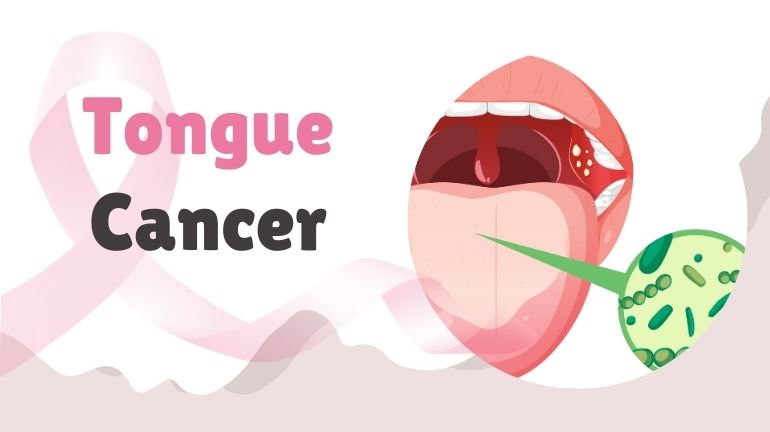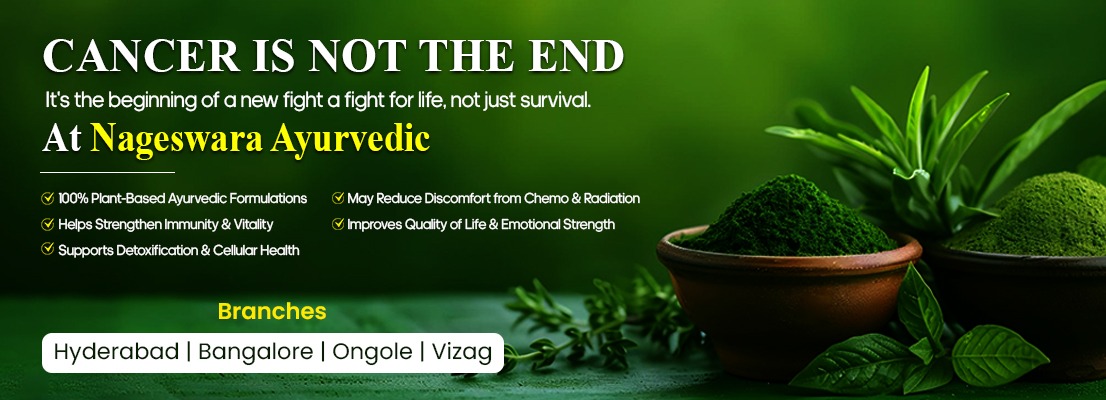
Tongue Cancer
Tongue cancer is a malignant growth that develops in the tissues of the tongue, usually beginning in the thin, flat squamous cells that line its surface. It is considered a subtype of oral cancer and is among the most common cancers of the head and neck region.
The disease often starts as a small ulcer or white/red patch that fails to heal and can later invade deeper tissues and lymph nodes. Early detection is crucial because tongue cancer can spread rapidly to lymph nodes in the neck.
Ayurveda views tongue cancer as Jihvagata Arbuda, arising from Rakta dhatu dushti (impure blood), Mamsa dhatu vikriti (muscle tissue derangement), and Pitta–Kapha aggravation leading to abnormal growth and ulceration.
Causes of Tongue Cancer
- Tobacco and betel nut chewing: Primary cause of tongue carcinoma in India.
- Alcohol consumption: Synergistic with tobacco in damaging oral mucosa.
- Human Papillomavirus (HPV) infection: A recognized viral risk factor.
- Chronic irritation: From sharp teeth, dentures, or poor oral hygiene.
- Nutritional deficiency: Vitamin A, zinc, and folate deficiency impair mucosal healing.
- Radiation exposure: Increases risk of secondary cancers.
Ayurvedic Causes (Nidana)
- Excessive consumption of spicy, sour, or acidic foods (Pitta aggravating).
- Intake of Viruddhahara (incompatible foods) and Vishadravyas (toxins).
- Suppressed emotions like anger and stress.
- Accumulation of Ama and vitiation of Rakta and Mamsa dhatus.
Types of Tongue Cancer
- Squamous Cell Carcinoma – Most common; affects surface epithelium of the tongue.
- Verrucous Carcinoma – Slow-growing, associated with tobacco chewing.
- Basaloid and Adenosquamous Carcinomas – Rare, aggressive subtypes.
- Posterior Tongue Cancer – Usually more advanced at diagnosis; high metastatic potential.
Risk Factors
- Tobacco chewing, smoking, and alcohol use.
- HPV infection.
- Poor oral hygiene and chronic trauma.
- Nutrient deficiencies.
- Excessive Pitta aggravation due to spicy diet or stress.
- Family history of oral cancers.
- Low antioxidant intake.
Signs & Symptoms
- Persistent ulcer or sore on the tongue that does not heal.
- Pain or burning sensation in the tongue or throat.
- Difficulty in speaking, swallowing, or moving the tongue.
- White, red, or mixed patches on the tongue.
- Unexplained bleeding from lesions.
- Lump, thickening, or restricted tongue movement.
- Ear pain, weight loss, or swollen neck nodes in advanced stages.
Complications
- Difficulty in eating, swallowing, or speaking.
- Severe pain and infection in ulcerated lesions.
- Lymphatic spread to cervical nodes.
- Recurrence after surgery or radiotherapy.
- Nutritional deficiencies due to reduced oral intake.
- Cachexia and fatigue.
Ayurveda’s Perspective on Tongue Cancer
In Ayurveda, tongue cancer correlates with Jihvagata Arbuda or Raktaja Mukhroga. It develops due to chronic Pitta–Kapha imbalance, Rakta dushti, and Mamsa dhatu vitiation, resulting in ulceration, inflammation, and abnormal tissue growth.
Pathogenesis (Samprapti)
- Agnimandya → Ama formation.
- Ama + Pitta–Kapha aggravation → Rakta and Mamsa dushti.
- Chronic stagnation leads to Granthi → Arbuda (tumor) formation in Jihva (tongue).
Dosha Involvement
- Pitta: Burning, ulceration, bleeding, inflammation.
- Kapha: Swelling, sluggish healing, tumor growth.
- Vata: Pain, dryness, spread, and tissue degeneration.
Principles of Management
- Shodhana (Purification) – Remove Ama and Pitta–Kapha toxins.
- Shamana (Pacification) – Control inflammation, ulceration, and pain.
- Rasayana (Rejuvenation) – Strengthen immunity, rebuild tissues, and prevent recurrence.
Tongue Cancer Treatment at Nageswara Ayurvedic – Role of Zingiber officinale & Curcumin
At Nageswara Ayurvedic, tongue cancer management is based on a comprehensive Rasayana protocol combining Zingiber officinale (Ginger) and Curcumin (Turmeric extract) with plant-based Calcium, Phosphorus, and Magnesium to restore tissue health, immunity, and vitality.
Zingiber officinale (Ginger)
- Contains gingerols, paradols, and shogaols with potent anti-inflammatory and anticancer properties.
- Reduces oral mucosal inflammation, prevents infection, and enhances circulation to tongue tissues.
- Induces apoptosis (programmed cell death) in malignant cells while protecting healthy tissues.
- Clears Ama (toxins) and improves digestive strength, supporting Rasayana rejuvenation.
Curcumin (Turmeric Extract)
- Inhibits tumor growth and angiogenesis.
- Possesses strong antioxidant and anti-inflammatory effects.
- Prevents DNA mutations and supports natural healing of ulcers.
- Balances Pitta and Rakta doshas, providing cooling and detoxifying action.
Plant-based Minerals (Rasayana Support)
- Calcium (Cissus Extract 5.0%) – Strengthens oral bone and muscular integrity; aids post-surgical recovery.
- Phosphorus (Papaya Leaf Extract 3.0%) – Supports cellular repair and enhances mucosal healing.
- Magnesium (Moringa Leaf Extract 1.0%) – Regulates enzymatic function, reduces oxidative stress, and relaxes muscles.
Rasayana Herbs for Tongue Cancer Care
- Zingiber officinale (Ginger): Anti-inflammatory, detoxifying, circulatory stimulant.
- Curcumin (Haridra): Anticancer, antioxidant, tissue-protective.
- Guduchi (Tinospora cordifolia): Immunomodulator, reduces chemo-radiation side effects.
- Amalaki (Phyllanthus emblica): Antioxidant, enhances mucosal repair.
- Yashtimadhu (Glycyrrhiza glabra): Soothes ulcers, accelerates healing.
- Tulsi (Ocimum sanctum): Antiviral, adaptogenic, stress reducer.
- Bala (Sida cordifolia): Improves strength and stamina.
- Neem (Azadirachta indica): Purifies blood, reduces local infection and swelling.
Treatment Relevance at Nageswara Ayurvedic
1. Shamana (Pacification): Internal herbal medicines like Ginger, Curcumin, Guduchi, Yashtimadhu, and Neem reduce tumor inflammation and promote healing.
2. Rasayana (Rejuvenation): Long-term use of Ginger + Curcumin + Calcium, Phosphorus, Magnesium formulation rebuilds tissues, enhances Ojas (vital strength), and prevents recurrence.
3. Diet & Lifestyle: Recommended – fresh fruits, leafy greens, turmeric, moringa, coconut water, and antioxidant-rich juices. Avoid – tobacco, alcohol, spicy/sour/fried foods. Practice yoga, meditation, and pranayama to balance stress and Pitta.
4. Integration with Modern Care: Ayurvedic therapy helps reduce oral mucositis, ulcers, inflammation, and fatigue — improving tolerance and recovery during chemo or radiation.
